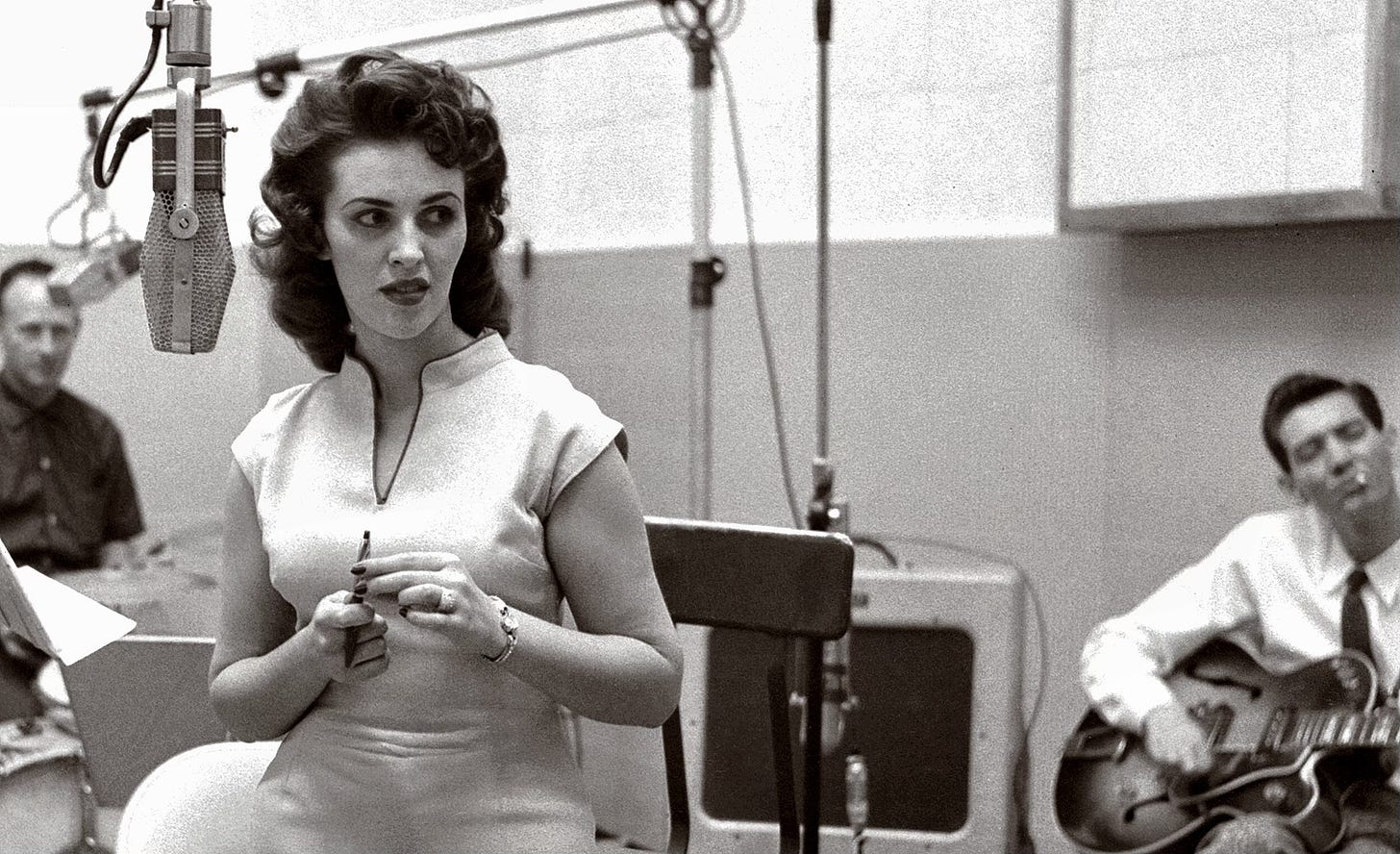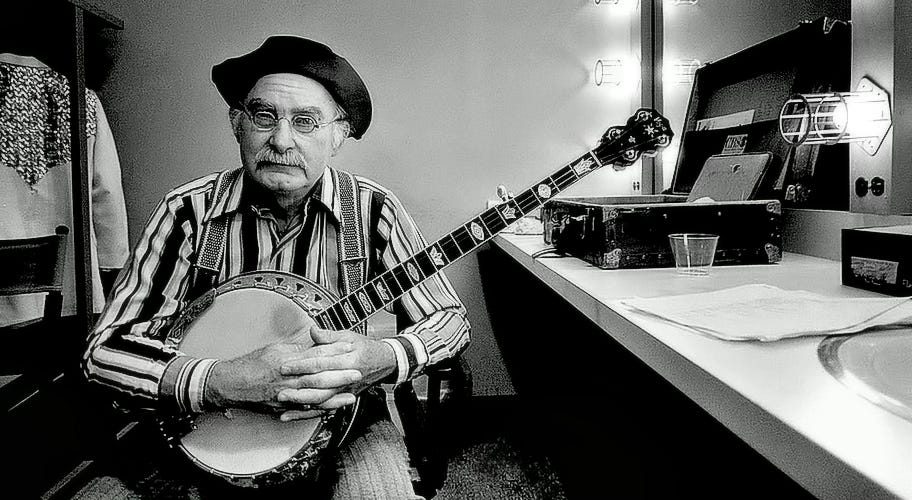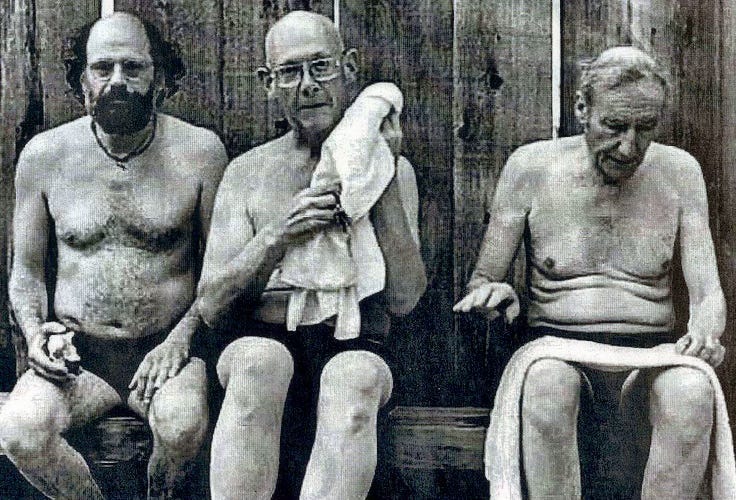Wanda Jackson, Queen of Rockabilly music, is 86 years old today
Wanda Jackson is 86 years old today.
A singer, songwriter, pianist and guitarist who had success in the mid-1950s and 1960s as one of the first popular female rockabilly singers and a pioneering rock and roll artist, Jackson is known to many as the Queen (or First Lady) of Rockabilly.
Jackson mixed country music with fast-moving rockabilly, often recording them on opposite sides of a record.
As rockabilly declined in popularity in the mid-1960s, she moved to a successful career in mainstream country music with a string of hits between 1966 and 1973, including "Tears Will Be the Chaser for Your Wine,” "A Woman Lives for Love" and "Fancy Satin Pillows.”
After graduating from high school, Jackson began to tour with her father as manager and chaperon. She often shared the bill with Elvis Presley, who encouraged Jackson to sing rockabilly. Jackson briefly dated Elvis, during which time Elvis sometimes would coach Jackson how to play rock 'n' roll.
During the 1950s, Jackson's stage outfits were often designed by her mother. Unlike traditional clothing worn by female country music singers of the time, she wore fringe dresses, high heels and long earrings. She has claimed she was the first female to put "glamor into country music."
She continued to record more rockabilly singles through the decade with producer Ken Nelson. Jackson insisted that Nelson make her records sound like those of label mates, Gene Vincent and the Blue Caps.
Nelson brought in many experienced and popular session players, including rock and roll pianist, Merill Moore, and the then unknown, Buck Owens. With a unique vocal style and upbeat material, Jackson created some of the most influential rock and roll music of the time.
Jackson has enjoyed a resurgence of popularity among rockabilly revivalists in Europe and younger Americana fans, and was inducted into the Rock and Roll Hall of Fame as an Early Influence in 2009.
On March 27, 2019, Jackson announced her official retirement from performing.
Here Jackson performs “Hard Headed Woman” in 1958.
Wanda Jackson is 86 years old today.
A singer, songwriter, pianist and guitarist who had success in the mid-1950s and 1960s as one of the first popular female rockabilly singers and a pioneering rock and roll artist, Jackson is known to many as the Queen (or First Lady) of Rockabilly.
Jackson mixed country music with fast-moving rockabilly, often recording them on opposite sides of a record.
As rockabilly declined in popularity in the mid-1960s, she moved to a successful career in mainstream country music with a string of hits between 1966 and 1973, including "Tears Will Be the Chaser for Your Wine,” "A Woman Lives for Love" and "Fancy Satin Pillows.”
After graduating from high school, Jackson began to tour with her father as manager and chaperon. She often shared the bill with Elvis Presley, who encouraged Jackson to sing rockabilly. Jackson briefly dated Elvis, during which time Elvis sometimes would coach Jackson how to play rock 'n' roll.
During the 1950s, Jackson's stage outfits were often designed by her mother. Unlike traditional clothing worn by female country music singers of the time, she wore fringe dresses, high heels and long earrings. She has claimed she was the first female to put "glamor into country music."
She continued to record more rockabilly singles through the decade with producer Ken Nelson. Jackson insisted that Nelson make her records sound like those of label mates, Gene Vincent and the Blue Caps.
Nelson brought in many experienced and popular session players, including rock and roll pianist, Merill Moore, and the then unknown, Buck Owens. With a unique vocal style and upbeat material, Jackson created some of the most influential rock and roll music of the time.
Jackson has enjoyed a resurgence of popularity among rockabilly revivalists in Europe and younger Americana fans, and was inducted into the Rock and Roll Hall of Fame as an Early Influence in 2009.
On March 27, 2019, Jackson announced her official retirement from performing.
Here Jackson performs “Hard Headed Woman” in 1958.
Tom Petty, New York City, 1976
Photo by Richard E. Aaron
Tom Petty was born 73 years ago today.
A singer-songwriter and multi-instrumentalist, Petty was the frontman of Tom Petty and the Heartbreakers and was a founding member of the late 1980s supergroup, Traveling Wilburys, and Mudcrutch.
He also performed under the pseudonyms of Charlie T. Wilbury, Jr. and Muddy Wilbury.
Petty recorded a number of hit singles with the Heartbreakers and as a solo artist, many of which remain heavily played on adult contemporary and classic rock radio.
His music, and notably his hits, became popular among younger generations. Throughout his career, Petty and his collaborators sold more than 60 million albums.
Petty was found unconscious at his home, not breathing and in full cardiac arrest, early in the morning of October 2, 2017. He was taken to the UCLA Medical Center in Santa Monica, California, where he died at 8:40 p.m. that evening.
Here, Petty performs “You Don’t Know How It Feels” in 2006.
Arlene Francis on NBC’s Home, 1957
Arlene Francis is remembered by most of us as a talk show host on WOR Radio and a game show panelist on CBS’s “What’s My Line.”
Yet Francis, who was born 116 years ago today, was a pioneer for women on television. She began her career as an actress. Active on Broadway, she acted in several films, debuting in the role of a prostitute in Murders in the Rue Morgue (1932), which had her falling prey to mad scientist, Bela Lugosi.
In the 1960s, Arlene Francis appeared as the wife of James Cagney in the comedy, One, Two, Three (1961), directed by Billy Wilder and filmed on location in Munich.
She also made The Thrill of It All (1963) and the television version of the play, Laura (1968), which she had played on stage several times.
In her earliest days, Francis worked on stage and on radio with Orson Welles. I did an audio documentary in the late 1980s with Leonard Maltin about actors who had worked with Welles.
In February, 1988, Francis gave me an interview and I visited her New York City apartment. She was a charming and very friendly lady. We talked in her living room.
Welles “was very imaginative and his manner of forcefulness in what he had to say was powerful. I mean you just had to pay attention and I think it was one of the first times radio had heard anybody with that kind of positive, able, brilliance in his introduction to a play or into his understanding of the part that he was playing. He was always Orson, I will say that. Very few people argued with Orson about anything, I noticed,” said Francis.
“I noticed mostly because I wouldn't have dared, but I mean mostly they just took his word for it, although he was always open to suggestions and talks and so forth....and I remember one time when his first wife, Virginia, said 'I don't happen to think that's the right way to do that.' And he said, 'But I do.'
And she had an ice cream soda in her hand in a container and she just threw it at him in front of the whole company. He just mopped it up and they went on working...” (laughter)
As the infamous "War of the Worlds" aired on radio on October 30, 1938, Francis was in rehearsals for Welles' stage production of "Danton's Death." She remembers Welles arriving at the theatre after the broadcast.
“And so we used to rehearse at the theatre until midnight or later and Orson came from that broadcast and he burst into....we were all waiting for him....he burst into the auditorium and said: 'I don't know what's going to happen. The police are gonna be after me. I know all hell has broken loose now because of the fact that I had this 'War of the Worlds' done so well that they really thought it was going on.
“And he couldn't believe the reaction to it....none of us could. But we all stayed there a long time and he was talking about it."
He said "it was nothing, they made such a big thing out of nothing. How could they do that? How are people so so silly as to believe the thing like that? In the first place, they hear my voice. They don't think I'm gonna be the one to announce the war between the worlds."
The rest, they say, is history.
Francis died at age 93 on May 31, 2001 in San Francisco. Her death was attributed to Alzheimer's disease and cancer.
Illustration of Rimbaud by Ernest Pignon-Ernest
Arthur Rimbaud, French poet, was born 169 years ago today.
Born in Charleville, Ardennes, Rimbaud produced his works while still in his late teens — Victor Hugo described him at the time as "an infant Shakespeare" — and he gave up creative writing altogether before the age of 20.
As part of the decadent movement, Rimbaud influenced modern literature, music and arts, and prefigured surrealism. He was known to have been a libertine and a restless soul, traveling extensively on three continents before his death from cancer just after his 37th birthday.
Rimbaud's first poem to appear in print was "Les Étrennes des orphelins" ("The Orphans' New Year's Gift"), which was published in the January, 1870 issue of Revue pour tous.
Two weeks after his poem was printed, a new teacher, Georges Izambard, arrived at the Collège de Charleville. Izambard became Rimbaud's literary mentor and soon a close accord formed between professor and student and Rimbaud for a short time saw Izambard as a kind of older brother figure.
From late 1870, Rimbaud's behavior became outwardly provocative. He drank alcohol, spoke rudely, composed scatological poems, stole books from local shops and abandoned his characteristically neat appearance by allowing his hair to grow long.
Rimbaud was encouraged by friend and office employee, Charles Auguste Bretagne, to write to Paul Verlaine, an eminent Symbolist poet, after letters to other poets failed to garner replies.
Taking his advice, Rimbaud sent Verlaine two letters containing several of his poems, including the hypnotic, gradually shocking "Le Dormeur du Val" (The Sleeper in the Valley), in which certain facets of Nature are depicted and called upon to comfort an apparently sleeping soldier. Verlaine, who was intrigued by Rimbaud, sent a reply that stated, "Come, dear great soul. We await you; we desire you," along with a one-way ticket to Paris.
Rimbaud arrived in late September, 1871 at Verlaine's invitation and resided briefly in Verlaine's home.
Verlaine, who was married to the seventeen-year-old and pregnant, Mathilde Mauté, had recently left his job and taken up drinking. In later published recollections of his first sight of Rimbaud, Verlaine described him at the age of seventeen as having "the real head of a child, chubby and fresh, on a big, bony rather clumsy body of a still-growing adolescent, and whose voice, with a very strong Ardennes accent, that was almost a dialect, had highs and lows as if it were breaking."
Rimbaud and Verlaine began a short and torrid affair. Whereas Verlaine had likely engaged in prior homosexual experiences, it remains uncertain whether the relationship with Verlaine was Rimbaud's first. During their time together they led a wild, vagabond-like life spiced by absinthe and hashish.
They scandalized the Parisian literary coterie on account of the outrageous behavior of Rimbaud, the archetypical enfant terrible, who throughout this period continued to write strikingly visionary verse. The stormy relationship between Rimbaud and Verlaine eventually brought them to London in September, 1872, a period about which Rimbaud would later express regret.
During this time, Verlaine abandoned his wife and infant son — both of whom he had abused in his alcoholic rages. Rimbaud and Verlaine lived in considerable poverty, in Bloomsbury and in Camden Town, scraping a living mostly from teaching, in addition to an allowance from Verlaine's mother.
In February, 1891, Rimbaud developed what he initially thought was arthritis in his right knee. It failed to respond to treatment and became agonizingly painful, and by March, the state of his health forced him to prepare to return to France for treatment.
In Aden, Rimbaud consulted a British doctor who mistakenly diagnosed tubercular synovitis and recommended immediate amputation. His right leg was amputated in May. The post-operative diagnosis was cancer. He died in Marseilles on November 10, 1891 at the age of 37.
Rimbaud's poetry, as well as his life, made an indelible impression on 20th century writers, musicians and artists. Pablo Picasso, Dylan Thomas, Allen Ginsberg, Vladimir Nabokov, Bob Dylan, Patti Smith, Giannina Braschi, Léo Ferré, Henry Miller, Van Morrison and Jim Morrison have been influenced by his poetry and life.
Béla Ferenc Dezső Blaskó — better known as Bela Lugosi — was born 141 years ago today.
Lugosi was a Hungarian actor, who is best known for playing the character "Dracula" in the 1931 film and for his roles in various other horror films.
He had been playing small parts on the stage in his native Hungary before making his first film in 1917, but had to leave the country after the failed Hungarian Revolution. He arrived in America as a seaman on a merchant ship.
In 1927, he appeared as Count Dracula in a Broadway production, which Hamilton Deane and John Balderston had dramatized from Bram Stoker's novel. He was talent-spotted as a character actor for the new Hollywood talkies, appearing in the first Dracula film with sound.
Louis Marshall Jones, better known as Grandpa Jones, was born 110 years ago today.
Jones was a banjo player and "old time" country and gospel music singer, and a member of the Country Music Hall of Fame. Born in the farming community of Niagara in Henderson County, Kentucky, Jones spent his teenage years in Akron, Ohio, where he began singing country music tunes on a radio show on WJW.
In 1931, Jones joined the Pine Ridge String Band, which provided the musical accompaniment for the very popular Lum and Abner show.
By 1935, his pursuit of a musical career took him to WBZ (AM) radio in Boston where he met musician/songwriter Bradley Kincaid, who gave him the nickname "Grandpa" because of his off-stage grumpiness at early-morning radio shows.
Jones liked the name and decided to create a stage persona based around it. Later in life, he lived in Mountain View, Arkansas. Performing as Grandpa Jones, he played the guitar, yodeled and sang mostly old-time ballads.
Allen Ginsberg, Philip Whalen and William F. Burroughs, Colorado, 1976
Philip Whalen, a key beat generation poet, was born 100 years ago today.
A Zen Buddhist, Whalen was a key figure in the San Francisco Renaissance movement. Born in Portland, Oregon, he served in the U.S. Army Air Forces during World War II. He later attended Reed College on the GI Bill.
There, he met Gary Snyder and Lew Welch, and graduated with a BA in 1951. He read at the famous Six Gallery reading in 1955 that marked the launch of the West Coast Beats into the public eye.
He appears, in barely fictionalized form, as the character, "Warren Coughlin," in Jack Kerouac's The Dharma Bums, which includes an account of that reading.
In Kerouac’s Big Sur, he is, "Ben Fagan.” Whalen's poetry was featured in Donald Allen's anthology, The New American Poetry 1945-1960.
Michael McClure, 1975
Photo by Frank Beacham
Michael McClure, beat poet, was born 91 years ago today.
A poet, playwright, songwriter and novelist, McClure found fame as one of the five poets (including Allen Ginsberg and Philip Whalen) who read at the famous San Francisco Six Gallery reading in 1955.
The reading is described in barely fictionalized terms in Jack Kerouac's Dharma Bums. He soon became a key member of the Beat Generation and is immortalized as "Pat McLear" in Kerouac's, Big Sur.
McClure's first book of poetry, Passage, was published in 1956 by small press publisher, Jonathan Williams. His poetry is heavily infused with an awareness of nature, especially in the animal consciousness that often lies dormant in mankind.
On October 20, 1947 — 76 years ago today — the notorious Red Scare kicked into high gear in Washington, as a Congressional committee began investigating Communist influence in Hollywood.
After World War II, the Cold War began to heat up between the world's two superpowers — the United States and the Soviet Union. In Washington, conservative watchdogs tried to reveal communists in government before setting their sights on alleged "Reds" in the famously liberal movie industry.
In the investigation, the House Un-American Activities Committee (HUAC) grilled a number of prominent witnesses, asking bluntly "Are you or have you ever been a member of the Communist Party?"












